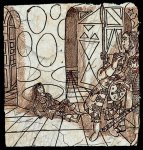JacktheRabbit
Explorer
Simple question, not sure what the simple answer is.
Players talking, CONSTANTLY. One of the most common conversations is players announcing when their character is out of juice after a particular fight. It is quite common for the cleric to say they are out of healing, the wizard or sorcerer may then say they only have one or two spells left, the warriors announce how low on hitpoints they are, you get the point.
It happens all the time. The conversation doesnt last long, it generally results in the party deciding to explore more or take a short or long rest.
Now here is the thing. All of this is technically "Character Conversation" sure a fighter doesnt have to tell you he is down to 5 hitpoints, he looks beat to hell and is bleeding on the marble floor. The spellcasters are not so obvious, you have to tell someone you are low on spells.
So this is the dick move part.
Is it a dick move to have foes (of course make them roll stealth checks etc) spy on and stalk the party and when they hear the party talking out loud about how low on resources they are to step out laugh at the party tell them "We appreciate you telling us how hurt you are, it will make it so much easier to kill you" and then attack the party?
To me it is totally fair, your characters were having a conversation and anyone can try to listen in and take advantage. Players may say that they were talking not their characters but to me that is impossible, your characters can only communicate this information by talking.
Opinions?
(As a side note I have not done this yet as a DM, the thought just came to me as a player listening to a bunch of my fellow party members loudly announce they were completely out of spells)
Players talking, CONSTANTLY. One of the most common conversations is players announcing when their character is out of juice after a particular fight. It is quite common for the cleric to say they are out of healing, the wizard or sorcerer may then say they only have one or two spells left, the warriors announce how low on hitpoints they are, you get the point.
It happens all the time. The conversation doesnt last long, it generally results in the party deciding to explore more or take a short or long rest.
Now here is the thing. All of this is technically "Character Conversation" sure a fighter doesnt have to tell you he is down to 5 hitpoints, he looks beat to hell and is bleeding on the marble floor. The spellcasters are not so obvious, you have to tell someone you are low on spells.
So this is the dick move part.
Is it a dick move to have foes (of course make them roll stealth checks etc) spy on and stalk the party and when they hear the party talking out loud about how low on resources they are to step out laugh at the party tell them "We appreciate you telling us how hurt you are, it will make it so much easier to kill you" and then attack the party?
To me it is totally fair, your characters were having a conversation and anyone can try to listen in and take advantage. Players may say that they were talking not their characters but to me that is impossible, your characters can only communicate this information by talking.
Opinions?
(As a side note I have not done this yet as a DM, the thought just came to me as a player listening to a bunch of my fellow party members loudly announce they were completely out of spells)











